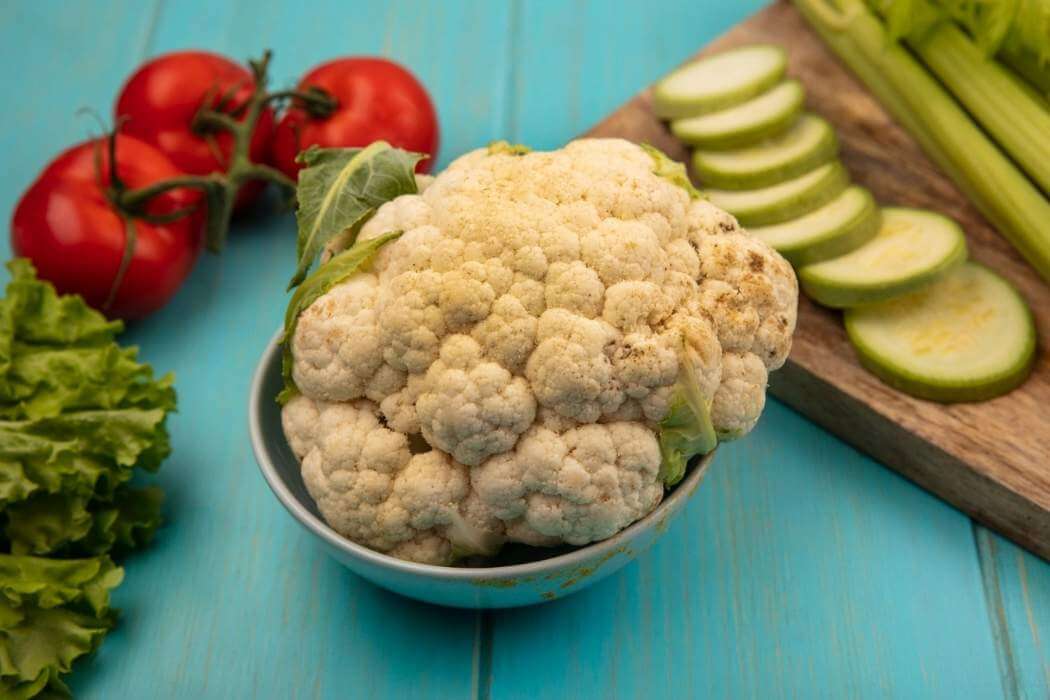Cauliflower, often regarded as a versatile and low-carb substitute for grains and legumes, has grown in popularity due to its mild flavor and impressive health benefits. Whether roasted, steamed, or even riced, cauliflower has earned a well-deserved reputation as a nutritious vegetable that can be incorporated into various dishes. But just how healthy is cauliflower? Let’s explore its nutritional profile and the key health benefits it offers.
Nutritional Profile of Cauliflower
Cauliflower is a powerhouse of nutrients despite its low-calorie content. Here’s what you can expect from one cup (about 100 grams) of raw cauliflower:
- Calories: 25
- Carbohydrates: 5 grams
- Dietary Fiber: 3 grams
- Protein: 2 grams
- Vitamin C: 77% of the Daily Value (DV)
- Vitamin K: 20% of the DV
- Folate: 14% of the DV
- Vitamin B6: 11% of the DV
- Potassium: 9% of the DV
- Magnesium, Phosphorus, and Calcium: Small amounts
Cauliflower is especially rich in vitamins C and K, making it an excellent choice for boosting immune function and supporting bone health. It’s also a good source of fiber, promoting digestive health, and contains phytonutrients and antioxidants that help protect the body against disease.
Key Health Benefits of Cauliflower
1. Rich in Antioxidants
Cauliflower contains powerful antioxidants that help protect your cells from oxidative stress and reduce inflammation. Its high levels of vitamin C act as an antioxidant to neutralize harmful free radicals in the body, potentially lowering the risk of chronic diseases like heart disease and cancer.
In addition to vitamin C, cauliflower is rich in glucosinolates and isothiocyanates, compounds that have been shown to inhibit the growth of cancer cells, particularly in breast, colon, and prostate cancers.
2. Supports Digestive Health
Cauliflower is an excellent source of dietary fiber, which is essential for maintaining a healthy digestive system. Fiber adds bulk to stool, helping prevent constipation, promoting regular bowel movements, and supporting overall gut health. The fiber in cauliflower also helps feed the good bacteria in the gut, which plays a vital role in digestion and nutrient absorption.
Additionally, cauliflower contains compounds like glucosinolates, which promote the production of beneficial enzymes in the gut that aid in detoxification and digestion.
3. A Low-Carb, Keto-Friendly Option
Cauliflower has become a favorite among those following low-carb, keto, or paleo diets due to its versatility and low carbohydrate content. With only 5 grams of carbs per cup, it’s an excellent substitute for grains like rice and pasta, making it a go-to ingredient for those looking to cut down on carbohydrates without sacrificing flavor or texture.
Cauliflower rice, mashed cauliflower, and cauliflower crust pizza are just a few examples of how this vegetable can replace higher-carb foods while keeping meals nutritious and satisfying.
4. Promotes Weight Loss
Cauliflower is low in calories and high in fiber, making it an ideal choice for those looking to manage or lose weight. The fiber in cauliflower helps increase feelings of fullness, reducing overall calorie intake throughout the day. Moreover, its high water content (about 92%) means that cauliflower provides volume and satiety without adding too many calories to your meals.
Because it’s low in fat and carbs, cauliflower can be incorporated into a variety of weight-loss meal plans, offering versatility without compromising nutrition.
5. Supports Heart Health
The fiber, antioxidants, and anti-inflammatory compounds in cauliflower contribute to improved heart health. Fiber helps reduce cholesterol levels, while the antioxidants found in cauliflower, such as sulforaphane, protect blood vessels from oxidative damage, potentially lowering the risk of heart disease.
Sulforaphane is also known to help reduce blood pressure and improve kidney function, adding another layer of cardiovascular protection.
6. May Reduce Cancer Risk
Cruciferous vegetables like cauliflower contain several compounds that have been shown to lower the risk of certain types of cancer. Sulforaphane, a compound found in cauliflower, has been extensively studied for its anticancer properties. Research suggests that sulforaphane may inhibit the growth of cancer cells and promote the destruction of cancerous cells, particularly in breast, colon, and prostate cancers.
Cauliflower is also rich in indoles and isothiocyanates, compounds that have been linked to reducing cancer risk by helping to deactivate carcinogens and prevent tumor growth.
7. Supports Bone Health
Cauliflower’s high vitamin K content plays an essential role in bone health. Vitamin K is crucial for proper calcium absorption and the formation of bone proteins, which help maintain bone strength and density. Adequate intake of vitamin K has been linked to a lower risk of osteoporosis and fractures, especially in older adults.
How to Incorporate Cauliflower into Your Diet
Cauliflower’s mild flavor and adaptable texture make it an easy ingredient to incorporate into a wide variety of meals. Here are some creative ways to enjoy cauliflower:
- Roasted Cauliflower: Toss cauliflower florets with olive oil, garlic, and spices, and roast them in the oven for a crispy, flavorful side dish.
- Cauliflower Rice: Pulse raw cauliflower in a food processor until it resembles rice grains. Sauté with vegetables and seasoning for a low-carb alternative to traditional rice.
- Cauliflower Mash: Steam or boil cauliflower until soft, then mash it with garlic, butter, and cream for a healthier take on mashed potatoes.
- Cauliflower Pizza Crust: Combine riced cauliflower with cheese, eggs, and herbs to create a low-carb pizza crust.
- Cauliflower Soup: Blend cooked cauliflower with vegetable broth, garlic, and herbs for a creamy, healthy soup.
- Grilled Cauliflower Steaks: Slice a whole cauliflower into thick steaks, season with olive oil and spices, and grill for a plant-based main dish.
Is Cauliflower Healthy? Absolutely!
Cauliflower is not only a versatile and delicious vegetable, but it’s also packed with essential nutrients that support overall health. From its high antioxidant content to its digestive and heart health benefits, cauliflower deserves a spot in any balanced diet. Whether you’re looking to manage your weight, boost your intake of vitamins, or incorporate more plant-based options into your meals, cauliflower is a nutritional powerhouse that delivers on all fronts.
So, the next time you’re looking for a nutritious, low-calorie vegetable to add to your meal, reach for cauliflower—it’s a healthy choice that doesn’t disappoint!









